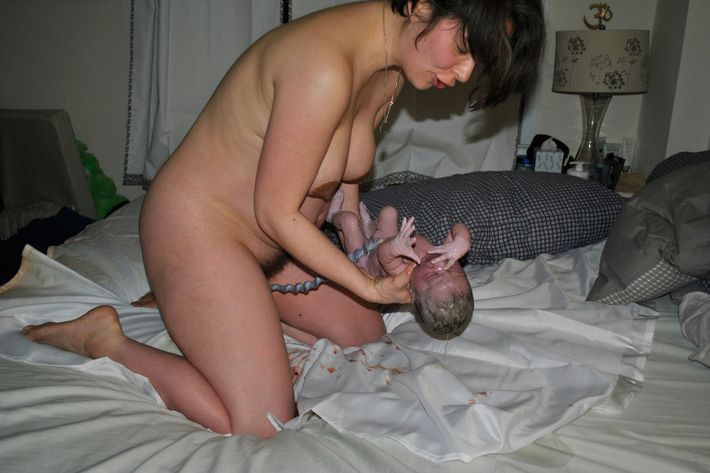
Two nights ago, on the eve of her daughter’s first birthday, a woman named Francie posted a photo of her first moments with her on a private Facebook group called NYC Birth. The group, which has 836 members, is for “pregnant people, people trying to conceive, those who have birthed their children in NYC, and adoptive parents.” Topics discussed include home birthing, New York City hospital and insurance options, breast-feeding support, and placental encapsulation — basic birth stuff. Because the group is private and relatively small, private information is freely discussed on a regular basis.
In the photo, Francie kneels on a bed, a surprised but joyful look on her face, as she holds her newborn infant in her hands. “We planned a home birth for our second daughter,” she told me. “She came really fast, less than an hour after I realized I was in labor, and no one made it in time. I yelled at my husband to get the camera when I was about to push her out, and he took two pictures when she was born.”
The caption of the photo she posted read: “Today it’s been one year since this happened. Where do I even begin? I am humbled. I am grateful. I am speechless, I am a badass. I am so glad my baby is one year old. And I just can’t believe it.”

Out of context, the photo might shock some people, but in the context of a smallish, private Facebook group dedicated to childbirth, one struggles to imagine it causing offense. There’s a little bit of blood, a lot of emotion, and one nipple, but as far as birth scenes go, it’s fairly tame. It’s not gory or upsetting; it contains practically no nudity. It is simply a lovely image of the first moments of a human being’s life as her mother welcomes her to the world.
Within an hour, however, someone at Facebook had removed the photo after a group member flagged it for violating the site’s terms of use. “My friend texted me to say the picture had been reported and I was blocked,” Francie, who lives in New York City and is a teacher and a lactation consultant for hand expression, said.
“[A Facebook message] showed me the picture and said it violated Facebook standards of nudity and then went on to talk about how some photos are sexually explicit,” she said. “It then prompted me to remove any other photos that contained nudity. The two on the prompt screen were me wearing my baby in a carrier, fully clothed.” After she affirmed that none of her other photos contained nudity, she was allowed back on the site and the group.
Facebook’s anti-nudity policy is pretty blunt. All images are treated the same, worldwide, across the site, so the fact that this photo appeared in a private group made no difference. According to the site’s rules, genitals and buttocks are forbidden, as are female breasts showing nipples, but it does “always allow photos of women actively engaged in breastfeeding or showing breasts with post-mastectomy scarring.” That last bit was added in June of 2014, when the company changed its policy in response to users’ outrage as part of the campaign known as #freethenipple.
Facebook, for its part, has said on a number of occasions that it doesn’t proactively seek out and remove such photos. Its breast-feeding FAQ states, “The photos we review are almost exclusively brought to our attention by other Facebook members who complain about them being shared on Facebook.”
So why did a member of a group dedicated to discussing childbirth flag the photo for being explicit? It’s anybody’s guess, but the NYC Birth group’s owner, Nora Painten, and her midwife, Kimm Sun, are hoping that Facebook will change how it reacts to such flaggings, as it has with breast-feeding photos. To that end they are hoping to raise awareness of Facebook’s policy toward photos of women in the act of childbirth.
“I am sincerely perplexed,” wrote Kimm, “by the act of shaming a woman by removing her picture simply Because You Have the Power to Do So, a picture a woman posted to show off her birth, her body’s beauty, her bravery, where their response was so positive, full of praise, and in a PRIVATE group where the members have asked to be part of that group. That is the very definition of disempowering a woman.”
Painten goes on: “These are not sex acts. This is not pornography. Hopefully, mothers posting their birth photos (which are often among their most treasured possessions) will bring attention to this issue and free others to share their joyful and life-affirming images without fear of being shamed or censored.”
Of course, the photo does violate Facebook’s stated policy against showing women’s nipples, but what is odd about its current stance is that, presumably, if Francie had been breast-feeding, the photo would have been otherwise compliant. The problem is that Facebook doesn’t consistently distinguish between sexual nudity and the female body in the act of mothering. But if a photo this joyful and inspiring violates the policy, then the policy should be changed.

